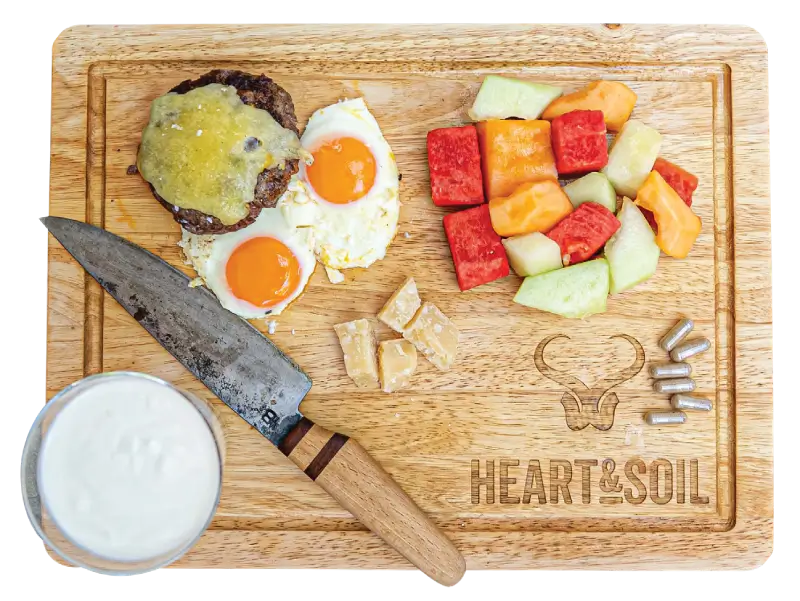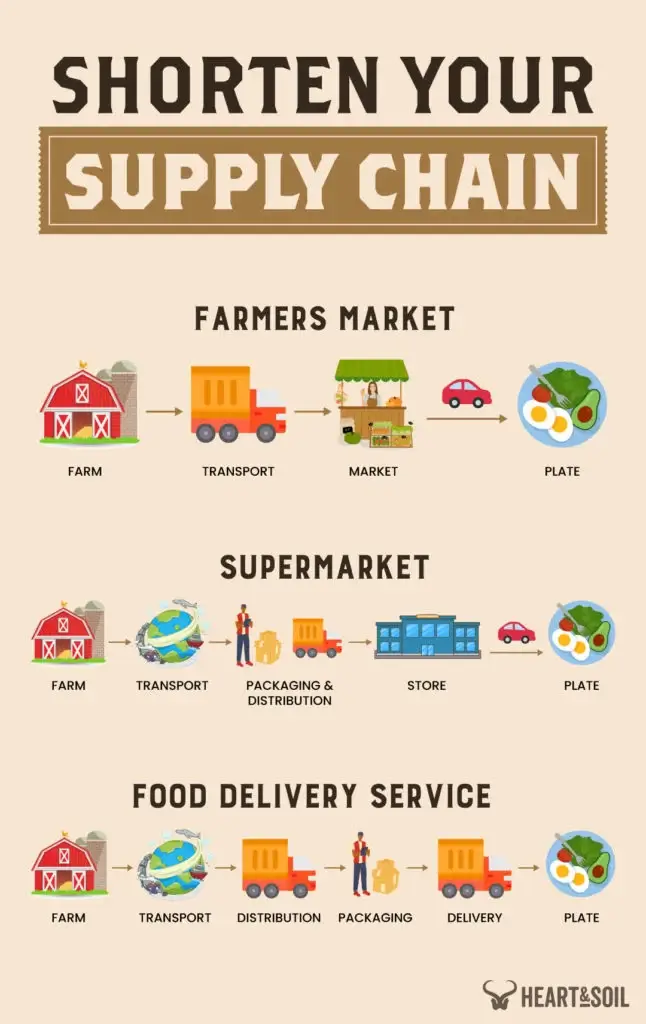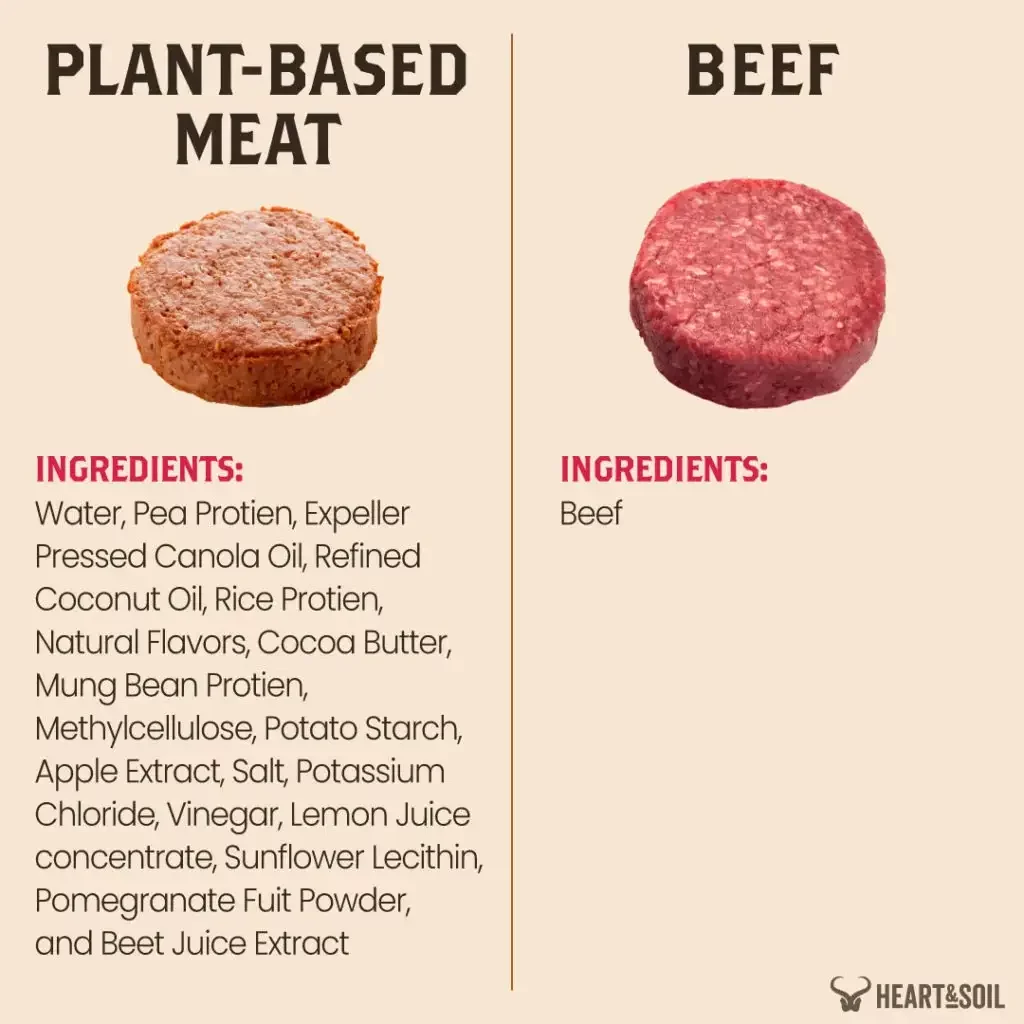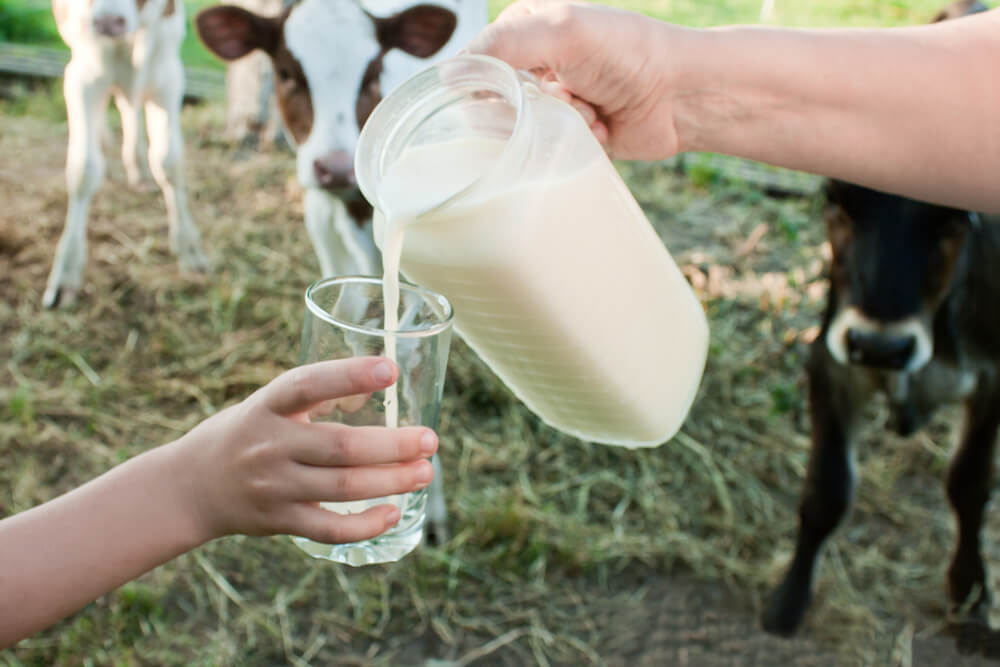- Animal-Based Shopping is Simple
- 7 Tips for Your Next Shopping Haul
- Animal-Based Eating: It's a Way of Life
Since 2020, we’ve talked to thousands of people who have transformed their health with an animal-based diet. In the beginning, they’re excited to reclaim their health, but when it comes time to do some animal-based grocery shopping, they often need a few pointers. That’s why we’re here today – to give you 7 tips (plus a bonus tip) to make animal-based grocery shopping easy!
If you’ve tried other “diets” in the past, you may have some built up trauma (we get it). Most modern diets are restrictive, insufficient, and can leave you feeling hungry and unsatisfied. They’re simply not constructed or optimized for the right goals (like achieving true metabolic health). The problem is further compounded by the fact that our modern way of eating is working against us. From our food supply chains to the way big box grocery stores are laid out, most of us are fighting an uphill battle towards health.
Here’s the good news…
We don’t consider animal-based eating to be a diet (at least not in a ‘restrictive’ sense). If anything, animal-based eating is the original human diet. It’s how our ancestors have eaten for millions of years. That’s why animal-based eating is such a powerful solution to the health problems we experience today.
Let’s dig in!
Animal-Based Grocery Shopping is Simple!
For starters, animal-based grocery shopping only requires a few key foods.
All you need is: meat, organs, fruit, honey and raw dairy (if you tolerate it).

For the purpose of this blog, we’ll assume that you already understand the evolutionary science behind animal-based eating. That said, here’s a short list to guide your next animal-based grocery shopping haul:
- Meat – aim for grass-fed/ finished ruminant animals (cattle, deer, lamb and bison).
- Organs – we prefer organs from cattle due to their availability and nutrient density. Liver is #1, but heart, spleen, kidney, brain and testicles are great too (it’s the reason Heart & Soil exists, after-all😎).
- Fruit – local and in season fruit is best. Aim for organic fruit if it’s out of season and must be purchased from a big box grocery store.
- Honey – raw and unfiltered is best.
- Raw Dairy – raw cheese and raw milk are great, but can be tough to find (check out our ‘Bonus Tip’ below for how to locate raw dairy near you)
7 Tips for Your Next Animal-Based Grocery Shopping Trip
Use the following tips for your next animal-based grocery shopping trip. We even included a few pro tips from our Heart & Soil teammates – enjoy!
1. Stick to the Basics
The beauty of an animal-based diet is its simplicity.
We’ve said it before and we’ll say it again: meat, organs, fruit, honey and raw dairy.
“The small details apply to some, but not everyone. Remember that meat, fruit, milk and honey are the most nutrient-dense foods you can prioritize.”
– Sophie H. (Health Success Program Coordinator)
Focus on the big picture and get your hands on the most nutrient dense foods on the planet. Keep it simple in the beginning and don’t get caught in the weeds. Once you have the basics covered, then you can focus on smaller details like finding microplastic-free salt or glyphosate-free, raw honey.
Start with protein. The perfect animal-based diet is centered around meat and organs. Well-raised grass-fed grass-finished beef should be the foundation of most of your meals. That doesn’t mean you should be filling your shopping cart with expensive ribeyes either… ground beef is your new best friend!
Sourcing organs: you can usually find organs like liver and heart from your local rancher and sometimes, your big box grocery store. However, other organs like spleen, kidney, brain and testicles can be nearly impossible to find – but are still vital for your health. Visit our store to source your high-quality beef organs in desiccated form.
Once you secure your beef and organs… fruit, raw honey and raw dairy are next on your list.
2. Start Local: Farmers Markets > Grocery Stores
Your local farmers market is the best place to start every animal-based shopping trip – for many reasons…
Farmers markets offer a great way to get connected with your community. They shorten your supply chain, which improves food quality and will pay dividends if supply chain disruptions occur. The best part is, farmers markets are well-known for having some of our favorite animal-based foods; like high-quality meat, fruit, honey and dairy (that’s the majority of your animal-based shopping list).

“Start with local farmers if you can. Check for farmers markets near you on localharvest.org.”
– Noel O. (Affiliate Program Manager)
Not sure which farmers markets are near you? Visit localharvest.org
Big box grocery stores are good for helping you fill in those last remaining items on your list like raw cheese, grass-fed grass-finished butter, and salt – to name a few. But beware of labels, processed foods and sugars (more on those below).
3. Shop the Perimeter, Avoid the Aisles
Most of us have heard this tip before. The perimeter of big box grocery stores is where you’ll find the freshest (least processed) foods like fruit, meat and dairy.
But the aisles on the other hand… they’re dangerous.
Remember the old days of mindlessly pushing your cart up and down every aisle? It was almost like a pastime for some of us. A visit to the grocery store wasn’t complete if we didn’t walk down every single aisle to look at the colorful boxes with tasty food (or so we thought). Well, things have changed and we’re a bit wiser these days. Now we know the aisles are full of processed food, loaded with seed oils and processed sugars. Our advice: proceed with caution if you find yourself walking down an aisle.
There are a few exceptions. The only animal-based friendly foods you may find in aisles are things like salt, tallow, ghee, and honey.
4. Buy Freezer Items and Shop In Bulk
Haters will say “animal-based grocery shopping is expensive.”
The truth is… your grocery expenses may actually decrease once you switch to eating animal-based. (Eating animal-based or carnivore on a budget is easier than you think.) With a little effort, it’s often cheaper than the Standard American Diet. Plus, once you factor in the money you save from being healthy and avoiding medical bills, eating animal-based is the best thing you can do for your bank account.
“Shop in bulk, stock up on freezer items, and buy what’s on sale!”
– Kelli M. (Customer Success Team Lead)
This might be our favorite tip → Shop sales, buy in bulk and stock up on freezer items. From time to time… meat producers and stores will run sales on beef. Take advantage of them and fill your freezer! This will save you money and time in the long run. Plus, meat, organs, fruit and honey are great items for longer-term food storage.
We always recommend shopping local before turning to online alternatives… but if you have trouble finding high-quality beef near you, check out two of our favorite online regenerative farms in the U.S.:
How long will meat, organs and fruit last in the freezer?
Meat and organs can last for up to 9-12 months in the freezer, but make sure that it’s vacuum sealed and avoid exposure to outside air.
Fruit can be frozen for up to 8 or 9 months. Again, make sure it’s vacuum sealed to keep out the outside air.
Is frozen fruit or fresh fruit healthier?
This may surprise you, but frozen fruit is healthier than fresh fruit. Why? It contains more micronutrients and less mold toxins because frozen fruits are typically picked and frozen at their ripest and most nutrient-dense point.
How long does raw honey last?
Honey is the ‘undisputed champ’ of storage foods. It has an incredibly long shelf life. How long? Let’s just say honey can last for decades… as long as you follow some basic rules. Keep it in a cool environment and tightly sealed in a glass container (we love mason jars).
5. Avoid Packaged Foods and Ingredients Labels
For the most part, if it comes in a box or has more than 1 ingredient, avoid it!!! These food-like substances are full of processed sugars, grains and seed oils.
If you’re at a big box grocery store, you should definitely read every label just to make sure you know what’s in your food. If you haven’t done this before, we promise you’ll be shocked.

What if you’re at a farmers market and its hard to find foods with labels? Noel has a great tip…
“Don’t get hung up on labels. Your local farmer may not participate in the government Organic Certification program (honestly, it’s a green flag). Seek pasture raised, local GMO-free foods from your local farmer before seeking organic).”
– Noel O. (Affiliate Program Manager)
Here’s a fun fact: the organic label isn’t the end-all-be-all of healthy food. Unfortunately there is some nuance to the term “organic” these days. You should aim for organic whenever possible, but when you’re speaking directly to a farmer or rancher, remember, some of them may not be able to afford to participate in the government’s Organic Certification program. However, that doesn’t mean their food isn’t far healthier than store bought “organic” foods.
Questions for Your Farmer
[Beef] What do your cows eat? Most cows are grass-fed but grain-finished (not ideal). We recommend you look for grass-fed and grass-finished beef.
[Fruit] Do you use any pesticides or spray anything on your crops (ie. fruit)? Avoid pesticides at all costs.
[Eggs] What do your chickens eat? You want eggs from pasture raised chickens that primarily forage for their food. If they must be fed supplementary feed, make sure it is soy and grain free.
Pro tip: don’t be afraid to ask if you can visit your farmer or rancher. It’s a great way to get a better understanding of exactly where your food comes from and a great opportunity to ask more questions. The truth is, most farmers and ranchers would love to show you around. Plus, it’s a fun activity to do with your kids!
6. Beware of Seed Oils
The devil is in the details. Seed oils seem to be hiding in everything, especially if you eat out at a restaurant. 99% of restaurants cook their food in seed oils like canola, soybean and rice bran oil, simply because they’re cheap.
One of the best things you can do for your health is to avoid seed oils and cook with healthy oils and fats instead.
Unhealthy oils: corn, safflower, sunflower, soybean, cottonseed, rapeseed, grapeseed, sesame, canola, peanut, and rice bran oils.
Recommended Fats: butter, ghee, and beef tallow.
Coconut, Avocado and Olive oils are generally healthy, but beware. Avocado and olive oils are known to be diluted with seed oils. Some studies have shown 80-100% of various samples to be adulterated with seed oils. Check the labels and make sure it’s 100% pure.
“Read every single label and don’t assume ingredients, even for an item that should only have one ingredient (like Avocado oil).”
– Josh W. (Marketing Director)
7. Say “Goodbye” to Sauces and Dressings (sort of)
If you really think about it, the old food we used to eat only tasted good because it was drenched in unhealthy sauces and dressings. (You never loved salad. You loved salad DRESSING). Sauces and dressings are littered with seed oils, sugar and ingredients that can inflame your gut.
Some people think animal-based food might taste bland. This is because our taste buds are programmed to enjoy the highly engineered processed foods we used to eat. The good news is, after a few weeks of cutting out junk food, your taste buds will readjust to the foods which our DNA is built to consume and you will begin to crave meat, organs, fruit honey and raw dairy above all else!
Saying “goodbye” to all the supermarket sauces and dressings doesn’t mean you can’t add something tasty to your meals. There are many ways to make your animal-based meals taste great…
Here are a few tried and true ingredients to use: you can add salt to almost anything. Try drizzling some raw honey over your beef or fruit (this might seem weird at first, but will likely change your life). Same goes for maple syrup.
Still can’t survive without dressings and condiments?
Check out Primal Kitchen. We don’t usually recommend products like this, but these folks specialize in seed-oil free condiments and dressings. But again, you really shouldn’t need extra flavors if you’re eating a proper animal-based diet.
Bonus Tip: Use RealMilk.com or GetRawMilk.com to Find Raw Milk Near You
“How do I find raw milk?” This is one of the most common questions we get.

When animal-based eaters find out the truth about milk (*raw milk, not the highly pasteurized milk we grew up drinking)… it seems like they’ll do almost anything to get their hands on it. Seriously, we’ve heard hundreds (maybe thousands) of stories of Heart & Soil customers driving 100+ miles and across state lines just to purchase raw milk.
Raw milk can be hard to find, though. It’s legal in some states. It’s a gray area in other states. And it’s even outright illegal in others. However, even in states where it’s illegal to purchase, you can still “consume the raw milk of your own animals.” In these cases there are workarounds like cattle leases, where a group of people own a portion of a goat or cow. The farmer milks the animal for you and gives you the raw milk. (See? Where there’s a will, there’s a way!)
As always, the best place to start is to ask around at your local farmers market. If you don’t have any luck, visit Realmilk.com or GetRawMilk.com and use their milk finding tools.
Good luck on your hunt for raw milk!
Animal-Based Eating: It’s a Way of Life
The best way to think about eating animal-based is that it’s not a diet, it’s a way of life. Your food should give you strength, power and above all… health. We believe in fueling our bodies with the most nutrient-dense foods on the planet, the foods that nature intended for us to eat. And the truth is, with the right habits, animal-based grocery shopping is simple.
To recap, use these 7 tips to make grocery shopping easy:
Tip #1: Stick to the Basics
Tip #2: Start Local: Farmers Markets > Grocery Stores
Tip #3: Shop the Perimeter, Avoid the Aisles
Tip #4: Buy Freezer Items and Shop in Bulk
Tip #5: Avoid Packaged Foods and Ingredients Labels
Tip #6: Beware of Seed Oils
Tip #7: Say “Goodbye” to Sauces and Dressings (sort of)
Bonus Tip: Use Realmilk.com or GetRawMilk.com to Find Raw Milk Near You
Trust us, once you get a few animal-based grocery shopping trips under your belt, you’ll realize how easy this way of life really is.
Thanks for reading! If you found this helpful, help us spread the word and share the blog!
Subscribe to future articles like this: